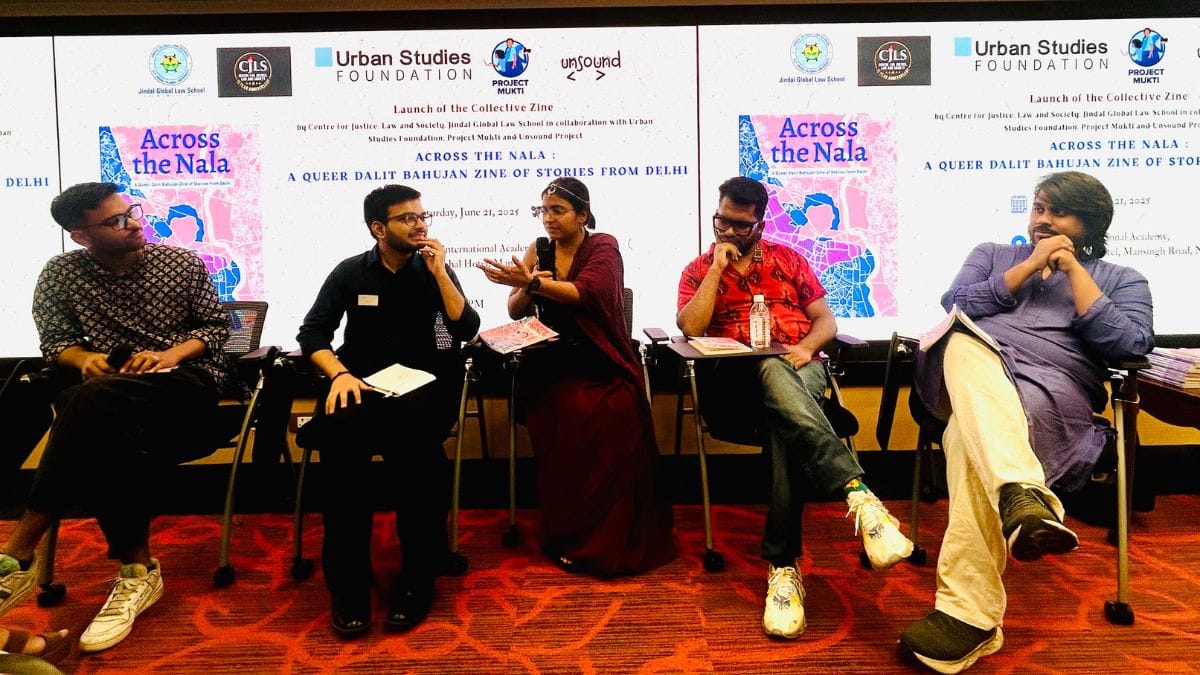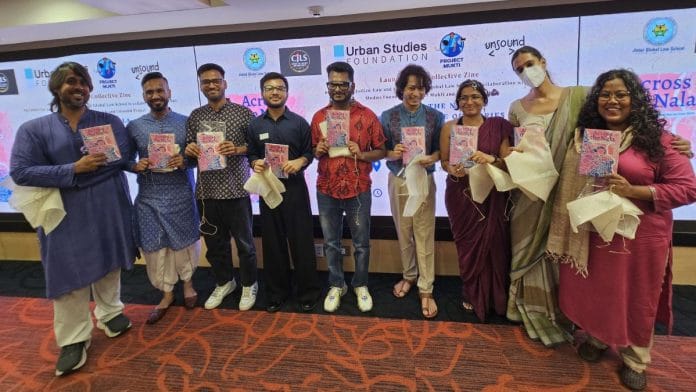New Delhi: Ten Dalit queer individuals met each other in a storytelling workshop last year. What started as an intimate discussion soon turned into an exchange about identity, belonging, and how growing up in Delhi shaped their lives.
On Sunday, these lived experiences were presented to the world as a zine.
A ‘zine’ is a small, self-published booklet or pamphlet that is typically created in small quantities and focuses on a specific or niche subject.
Across the Nala: A Queer Dalit Bahujan Zine of Stories from Delhi explores the perplexities of the relationship between caste, queerness, and Delhi. It is an illustrated collection of creative nonfiction.
“When I first came to Delhi, I had an anxious relationship with clothes,” said Dhiren Borisa, a Dalit queer activist who is the curator and the editor of the zine. He couldn’t afford many clothes at the time, and found it hard to fit in with his peers.
“One futile night, when I was studying in JNU, I wanted to escape, to run away,” he added.
That night, Borisa wanted to end his life. But he was saved by a close friend.
“The only way we can make the city home is by making friendships with people and places and by not running away from them,” he added. “Across the Nala is a testimony of the beauty of such stories.”
Borisa was joined at the Centre for Justice, Law and Society, OP Jindal Global University, by the writers and creators who worked on the zine. The hall was at capacity, filled with 40-odd people from the queer community.
In a panel discussion following the launch, writers Jatin Pawar, Arya, Bhumika Saraswati, and Neeraj Kumar shared their experiences of caste and queerness in Delhi. The discussion was moderated by queer journalist and writer Dhrubi Jyoti.
The zine is a collaborative effort between Project Mukti, Unsound Project, and the Urban Studies Foundation.

Geography & identity
In September 2024, Dhiren received a fellowship from Urban Studies Foundation. As part of the fellowship, he teamed up with Dhrubo Jyoti to host an urban storytelling workshop.
“At the time, we had a slight idea that we wanted to form a graphic out of these lived experiences,” said Dhrubo. “The zine became the product of shared experience during the workshop.”
The ten contributors wrote about their memories of the past during the workshop, which later turned into beautiful pink and blue illustrations by Rishabh Arora.
Arya, who wrote the chapter, ‘Places of Unravelling’, spoke about how the workshop made them feel secure and offered them visibility. But the visibility also came with a kind of violence.
“My body in the last week has lost 3 kgs. I am eternally feeling that violence inside, the feelings come out and speak what I feel in front of so many people,” he said. The struggle of presenting as a queer Dalit person to the world plays out in their body.
During the workshop, memories tumbled out, and people started discovering commonalities.
Neeraj Kumar and Jatin Pawar realised that they were once neighbours, and what connects them is a tributary of the Yamuna River, Sahibi, infamously known as Raghubir Nagar ka Nala. The two writers lived on different sides of the river.
Kumar is the founder of Unsound Project, a queer-led community centring anti-caste and feminist values, and a teaching fellow at Ashoka University. Their chapter, ‘Raghubir Nagar ka Nala’, the first in the zine, mentions that the geography of where you come from becomes an integral part of your identity.
Kumar was raised in Raghubir Nagar, a neighbourhood in West Delhi’s Rajouri Garden, which is located near a nala. The Hindi word translates to a drain, a fitting reflection of the Sahibi’s current condition. All the waste and dirt of West Delhi end up in the river.
“Why is it always Raghubir Nagar ka Nala, not Rajouri ka Nala? Because all rich and upper class and caste people live there,” Kumar said.
The chapter also showcases the duality of life forced upon them because of their roots. When they attended events in South Delhi, they couldn’t tell anyone that they lived near a nala.
“I can’t tell them the side effects of having silver jewellery if you live near the nala,” Kumar said.
They love wearing silver jewellery, having collected it over the years. However, fumes from the drain turn the silver black. While people in the South Delhi queer circles may admire the pretty pieces, they don’t see the labour that goes into keeping them clean.
Also read: Photo exhibition highlights unseen Jammu. ‘We often forget that it’s Jammu and Kashmir’
Across the nala
The Raghubir Nagar ka Nala is also a significant part of Pawar’s story in the zine. Their ‘Nala Paar Sisters’ explores the struggles of two Dalit queer individuals staying on either side of Sahibi. When Pawar moved out of Madipur, which is on the other side of the drain-river, to South Delhi for work, they faced invasive inquiries and judgement.
Pawar’s chapter reveals how the nala became a symbol of impurity. It also delves into their experiences as a Dalit queer person on dating apps, where they faced repeated questions on their caste identity and the place in the city to which they belonged.
In Arya’s chapter, they talk about leaving the casteism of the hills and moving to Delhi in the hopes of a better future. But instead of liberation, what they found was a suffocating, subtle casteism. Delhi didn’t rid them of caste.
“I thought changing cities would help me heal; Delhi did not. Today, I have an offer from the US for studies, but I do not know whether travelling there will heal me. There is no escape.”
(Edited by Prasanna Bachchhav)







Queerness is an abnormality. This LGBTQ business is unnatural and unacceptable.
These misguided idiots will destroy our communities and the nation.
It’s not too late for them to seek forgiveness from Allah. He is merciful and will certainly have mercy on these sinners. But course correction is a pre-requisite. Without genuine repentance for engaging in such unnatural and unethical acts they are destined to burn in hell.